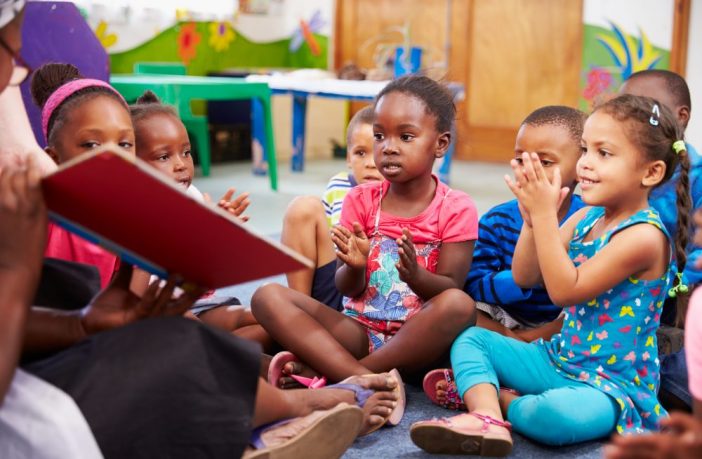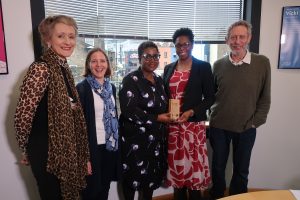
St Matthews school were the Whole School Award winners (L-R: Professor Teresa Cremin, Cally Poplak from Egmont, Sonia Thompson and Paulette Osborn, and Michael Rosen)
Two primary school teachers and a Birmingham based school are being celebrated for their innovation and creativity in encouraging pupils to read for pleasure.
Research by The Open University, Egmont and UK Literacy Association reveals the positive impact recreational reading can have on many aspects of a child’s life. This prompted the launch of the Reading for Pleasure Teaching Awards to recognise and share good practice.
Teresa Cremin, Professor of Education at The Open University was one of the judges. She said, “We know that teachers are under immense pressure to deliver results, and can find it challenging to make time within the curriculum for fostering reading for pleasure. But the social, emotional and cognitive benefits of reading for pleasure are unquestionable.”
A model of positive reading
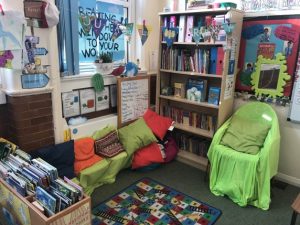
The book corner at Peover Superior Primary School in Knutsford inspires pupils
Emily Crumbleholme, from Peover Superior Primary School in Knutsford, won the Early Career Teacher award for creating an inspiring reading environment for her Year 2 and 3 classes. She has been encouraging young readers to discuss books, focus on their current interests and to extend the interest in reading to parents with the initiative ‘What did you read in the last 24 hours?’ A model of positive reading in the classroom, Emily expanded her knowledge of children’s literature and shared her own reading material.
She said: “I altered the book corner, held book clubs, modelled Reading for Pleasure and raised the profile of it. We also reorganised the library and eliminated out of date books to make it more appealing for the children in school. We have set up a Junior Librarian scheme in school to encourage the children to use it more regularly and therefore engage them as readers more.”
“I altered the book corner, held book clubs, modelled Reading for Pleasure and raised the profile of it.”
Book buddy system helps young readers
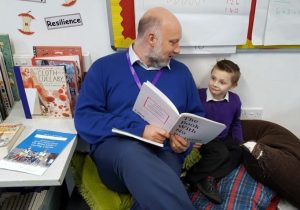
Jon Biddle created a successful book buddy scheme
Jon Biddle, from Moorlands Primary Academy in Belton, Norfolk, established a ‘book buddy’ system. Focusing efforts on more vulnerable pupils, this system created momentum that is now bringing pupil’s families on board. Teachers, pupils, support and office staff, have created a reading community by partnering up with pupils, linking together with those who enjoy the same subject. For example, a Year 4 teacher, who has a love of graphic novels, was paired with a child who also enjoys them but doesn’t have access to any at home.
Jon says: “Children look forward to the sessions and make the effort to turn up. Some have brought in a favourite book from home to read and some have arrived with books that they’ve enjoyed and then recommended to their adult buddy. This is helping the school to develop a genuinely reciprocal reading community, which will ultimately increase the children’s pleasure in reading.”
Reading for pleasure at the heart of the school
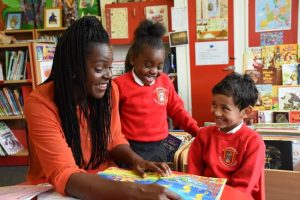
St Matthews C of E Primary School put reading for pleasure at the heart of the school
St Matthew’s C of E Primary School in Birmingham won the Whole School Award, by creating a school-wide initiative dedicating time and space to reading for pleasure in every classroom . A new Reading for Pleasure policy was written to ensure that that every child in the school learns within the context of a social reading environment; every child is regularly read to; that children have access to a wide range of books and to encourage and develop informal book talk and recommendations so children learn to be courageous readers.
In this short video, children’s author and poet Michael Rosen talks to Paulette Osborne and Sonia Thompson about how St Matthew’s put the emphasis on reading for pleasure:
Emily, Jon and St Matthew’s C of E Primary School were presented with their awards at a ceremony in London on 22 March. They received an individual award and were given £250 of Egmont book vouchers for their schools.
Find out more
For more information about Reading for Pleasure and how to inspire young readers visit the Research Rich Pedagogies website
Take a look at Open University courses in education, childhood and early years
Read Teresa Cremin’s tips on how to make reading magical; and creative ways teachers can get pupils writing
